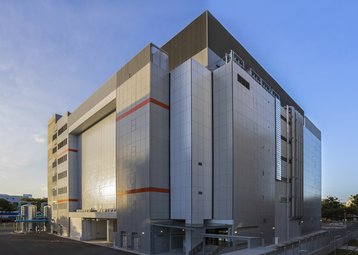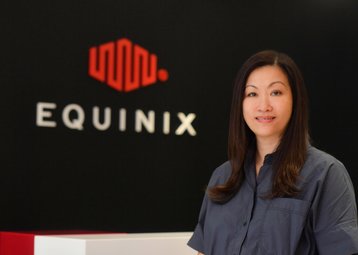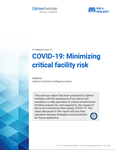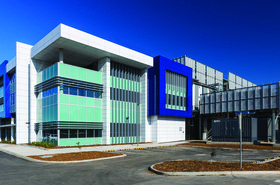Equinix last week launched its fourth data center in Singapore, giving it a presence in or near three of Singapore's five data center clusters: SG2 in the West near to Tanjong Kling, SG1 and the adjacent SG3 at Ayer Rajah Crescent, and the new SG4 in the northeast at the fast-growing Tai Seng cluster.
The company's biggest challenges right now are navigating the novel coronavirus pandemic safely, and preparing to deal with competition from hyperscale operators, according to Yee May Leong, the managing director of South Asia at Equinix. She also told us how the company plans to get involved with the Singapore government's AI-based Smart Nation drive.
Navigating a pandemic
Singapore has successfully kept a lid on the Covid-19 epidemic so far. Rules to limit interactions have so far prevented community transmission while allowing businesses to carry on operating. Equinix itself started planning early, Leong told us:
“We took a worst-case scenario from January when news [of Covid-19] first broke," she said. "We started monitoring daily the minimum staff sourcing required and the availability of parts onsite in case vendors are unable to deliver them.”
By the time the WHO announced the pandemic in March, the company was already primed and went straight into a mode of operation where employees worldwide were told to work from home. As has been widely reported, this has included restricting non-employee access to data centers in some of the worst-hit countries.
Today, in Singapore, a customer can still step into an Equinix data center - though this is mostly by appointment only. The situation is fluid, however, and Leong is aware that this could change.
Her team has also implemented a strong regime amongst staff, which closely matches best practice advice from bodies like the Uptime Institute: “As prepared as we are, we continue to adopt a paranoid stance. We have segregated our teams and ensured minimized contact with our data center team. And if necessary, our team can stay onsite – we have made provisions for that. We have also made provisions for a worst-case scenario in case of an infection [of a team member],” she explained.
Businesses in Singapore can draw from their experience of the SARS outbreak of 2003, which placed epidemics firmly on enterprises' business continuity plans. Leong says she expects Covid-19 to prompt enterprises to take a wider look at these plans and reevaluate whether they guarantee the capability to run their businesses remotely.
“I think we are far from where we need to be. I do believe that enterprises at large will continue to drive digital transformation very hard. Just as SARS was not the last, Covid-19 won’t be the last. [Post-Covid-19] I think we will see a surge in terms of companies seeking to improve their digital capabilities."
A hyperscale world
Another possible issue for Equinix is a shift in data center operations away from retail colocation and connectivity aimed at enterprise customers, towards a boom in hyperscale providers serving cloud providers delivering infrastructure as a service.
Earlier this year, Singapore-based AirTrunk told DCD that its 60MW Singapore data center is set to go live around mid-2020. Is Leong concerned about a shift in that direction - and if so, how will Equinix compete?
One part of Equinix's response is a $1bn joint venture between Equinix and Singapore sovereign wealth fund GIC announced in 2019. So far, this venture is starting with plans for Equinix to develop and operate four hyperscale-focused data centers in Europe - but Leong hinted this might be extended.
Equinix “will be announcing something” in Asia with a partner on the hyperscale front, she suggested.
However, she also stressed that there's still plenty of life in the enterprise sector: “Our part in this is to ensure that we are part of the ecosystem. We want to make sure that we have this continued momentum with hyperscale, and the ability to attract enterprises to Equinix. After all, enterprises will continue to embark on their hybrid and private cloud strategy. We believe in participating in [the hyperscale] space, [but] we will continue to maintain our leadership in our overall cloud ecosystem.”
It does seem there is ample room for growth in and around Singapore. Some 20 percent of Equinix’s more than 10,000 global customers are in the Asia Pacific region.
Raising a Smart Nation
Specifically in Singapore, Equinix supports the government's Smart Nation aims, which are built around the pillars of a digital economy, digital government, and digital society. “I think our vision for Singapore is to really be a part of Singapore’s Smart Nation goals,” said Leong. “To build a digital society is about having access to the latest technology to enhance everyday life, from finance, healthcare, education, and every single sector. We want to be a partner with the government in that.”
Singapore has a National AI strategy, which wants the country to become a global hub for developing, deploying and scaling AI solutions. and Leong wants to be part of this: “[The AI strategy] really means that the Singapore government plans to deepen the use of AI technology to transform the economy and fundamentally change the business landscape to gain more productivity and create more areas of growth.”
It's easy to see the reasons for her enthusiasm: AI means data and distributed processing, she says, and this means a need for more compute and interconnection.
According to her, the data needs to be analyzed at the edge, preferably in proximity to users so, of course, having four data centers across the city-state is a benefit: “You need to have a digital infrastructure that has the ecosystem and platform to enable that AI to basically be at customers’ fingertips right at the edge. Even in Singapore, you won’t want your data residing in the West when your outcomes need to be in the East. For me, it is all about latency, performance and the customer interaction.”
“Singapore has a lot of startups, a lot of cloud-first company which are basically embarking on the first phase or second phase of digital transformation,” she said, noting that many of these enterprises are now actively exploring or deploying AI.





